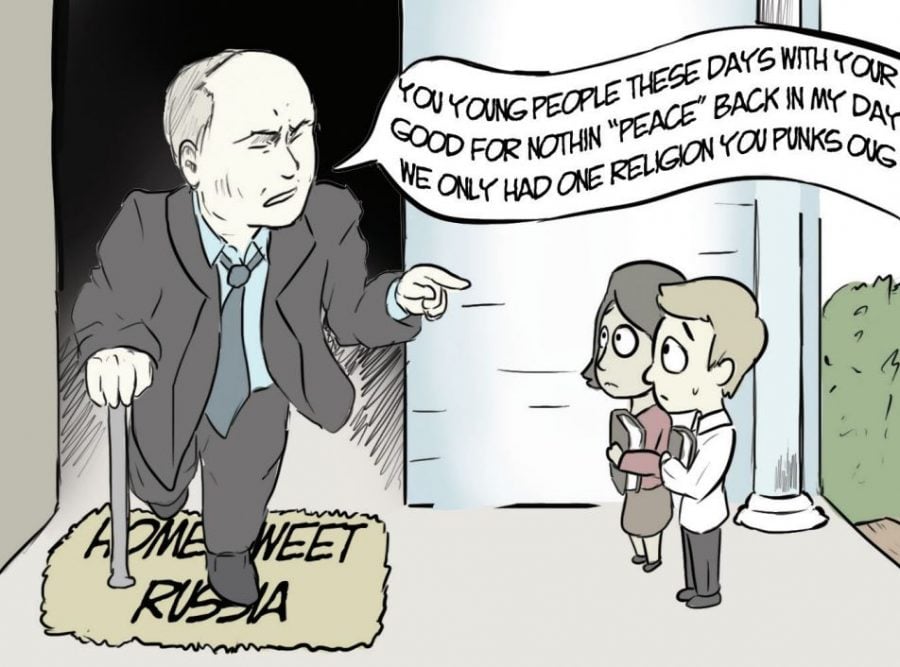Russia cracks down on Jehovah’s Witnesses
The Russian government has been cracking down on “extremism” lately.
Earlier this month, Russia banned a pro-LGBTQIA poster that used a picture of President Vladimir Putin because of its extremist content. In March, Kremlin-critic Alexei Navalny was jailed under the same anti-extremism law after organizing anti-Putin rallies.
The latest group to fall under the wrath of extremism charges is Russia’s 175,000 Jehovah’s Witnesses. The Russian government is making a move to outlaw the denomination due to its followers’ connection with “extremist activities” and distribution of “extremist texts.”
Founded in the United States in the late 19th century, Jehovah’s Witnesses are staunch conscientious objectors known for their door-to-door preaching. The religious group has had a minimal presence in Russia for at least 100 years.
“They banned Scientology,” said Professor of Political Science Ken Gilmore. “(Putin) has been cracking down on what they called ‘gay propaganda.’ It seems really consistent with Putin cracking down on any independent organization.”
As pacifists, Jehovah’s Witnesses refuse to serve in the military or attend state-sponsored rallies that glorify violence. Moreover, their adherence to political neutrality prevents them from voting.
“I think (Jehovah’s Witnesses) are a perceived threat,” Gilmore said. “170,000 people is a pretty sizable chunk of people who don’t vote or celebrate (at rallies). They look like they’re thumbing their nose at the Russian government.”
According to Gilmore, the effort to ban Jehovah’s Witnesses may be an appeal to the Russian Orthodox Church and its followers.
“It’s just one of those things where you’re playing to your base,” Gilmore said. “He probably has a lot of Orthodox Christians and old pensioners who harken back to some earlier time.”
Moreover, Gilmore compared the Russian government’s labeling of Jehovah’s Witnesses as extremists as being similar to actions carried out by U.S. President Donald Trump’s administration.
“Trump is doing the same thing with Planned Parenthood and NPR,” Gilmore said. “(Putin) has a lot of reactionaries in his country, just like we do in ours. Why would you ban Muslims when they make up such a small portion of the population and call them extremists?”
Others believe Jehovah’s Witnesses are being dubbed extremists because they are easy targets.
Because the religious group does not vote, politicians do not stand to lose any political clout by punishing them. Alexander Verkhovsky, director of the SOVA Center for Information and Analysis, a Moscow-based group that conducts research on extremism, nationalism, xenophobia and other topics, said Jehovah’s Witnesses are being made an example of.
“I cannot imagine that anyone really thinks they are a threat,” said Verkhovsky to The New York Times. “But they are seen as a good target. They are pacifists, so they cannot be radicalized, no matter what you do to them. They can be used to send a message.”
This is not the first time Jehovah’s Witnesses have been persecuted or placed under scrutiny in Russia. During the Soviet era, the KGB believed members of the denomination were spies for the U.S. and many were sent to labor camps or deported to Siberia. In 2009, several texts by Jehovah’s Witnesses were put on a list of “unacceptable literature.”
Vasily Khan, chairman of the denomination’s steering committee in Russia, claims the treatment of Jehovah’s Witnesses now echoes their persecution under Soviet leader Joseph Stalin.
“In Stalin’s time, when I was still a child, the whole family was deported to Siberia only because we were Jehovah’s Witnesses,” said Vasily on the religious group’s website. “It’s a shame and sad that my children and grandchildren will be faced with something like that.”










Barbara Leo • Apr 30, 2017 at 4:21 pm
Jehovah’s Witnesses are not thumbing their nose at the government, because they do not fight/take part in military, or because they remain neutral. It’s a stand they take to Not hurt another Christian, or anyone for that matter. How is that a bad thing? How is that Thumbing their nose, when they would rather obey God and his principles…than the hurtful dealings of governments that fight one another?
While other religions don’t think twice about war and going to another country to kill a fellow person of their own Faith… Yet, Jehovah’s witnesses would rather go to jail than harm another; just as it happened during World War II. They suffered just as much as those during the Holocaust. My mother was from Berlin, and said that as a child, she could not understand How Catholics could kill other Catholics. Yet, when she was studying with the Witnesses…she saw truth loving Faith in action.
While it appears that Russia has won their case against the good people of Jehovah’s Witnesses… they are setting a wonderful example of what True Christians should be doing – following in the steps of their Savior, Jesus Christ. They did it to Him…they will do it to His followers.
Sincerely from Woodbine NJ
victor • Apr 24, 2017 at 10:29 am
It is a shame what the Russian government is doing to my brothers ans sisters in that country. The only extreme thing we do is take the word of Jehovah God seriously and to heart. We would never hurt another human, unlike so many other religions that are represented in the military all over the world. This is nothing but the Russian Orthodox church fighting to keep what people they have for the bilking of money. Sad that’s what it all boils down to? Money. If they had the truth, people would listen and stay, but they have nothing but schemes and lies to keep people in fear with superstitions that are nowhere to be found in the bible. It is a shame that Russia itself had the Codex locked away, and let’s few people see it? The truth is in the bible, but sadly people don’t read it because at one time the clergy made it a sin to read it? Even threatening churchgoers with excommunication. If you are telling people the truth, you would not hide anything? The Russian Orthodox church is being questioned by people who have now read the bible, and they can’t stand against the truth. Most of the hocus pocus the churches of the world include in their pageantry is just lies, I say if you can’t prove it with the bible under close scrutiny, it is not the truth. The world has always killed God’s prophets, and continues to do so, Russia is just the latest in a long line of murderers. There is nothing God fearing people have to be afraid of in the bible. Yes, this world is in for a big surprise, when God once again ends his day of rest and turns is attention to the Harlot, which is made of the evil governments and churches that have taken advantage of people. If you have stayed close to God, you might have nothing to fear. We are not judging anyone, only warning of things to come, and showing prophecies that have been fulfilled up to this point so people can believe what the bible has said to be true, so they may once again turn to Jehovah and his son Jesus and be saved. If wanting to please our heavenly Father and his son Jesus is extremist? Then I say, Yes, we are! We are alien residents in this world, we do not seek to overthrow any government or be involved with them, we will not join in their military forces to kill anyone or hurt anyone. Christ himself said he was no part of this world, and neither are we. Our only interest is in educating people of God’s word so they can make an informed decision, whether they wish to serve Jehovah God also? Narrow is the gate leading to everlasting life, and few are the ones finding it, We want all to at least have the truth so they can survive to see the paradise that Adam and Eve lost.